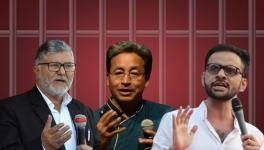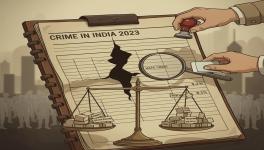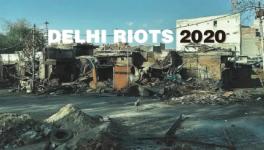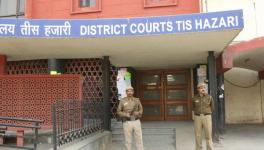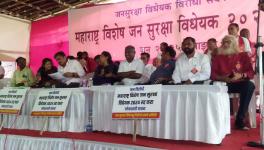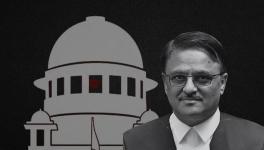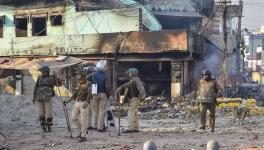Next Step: Courts Must Penalise Officers for Misusing UAPA
Many believed the police investigation into the February 2020 riots in Northeast Delhi was a charade, scripted to torment civil activists in the vanguard of the movement against the Citizenship Amendment Act. They claimed the charges against them for fomenting the riots were trumped up. They said a clutch of activists were booked under the Unlawful Activities (Prevention) Act (UAPA) only because its bail provisions are stringent, thus condemning them to prove their innocence from jail. The process is the punishment, they argued.
Going against what is generally considered the norm, and dispelling the fears of many, the Delhi High Court has granted bail to Asif Iqbal Tanha, Natasha Narwal and Devangana Kalita, all three booked under the UAPA in FIR 59/2020, which accuses 15 activists of conspiring to trigger the riots in Delhi. It should come as some relief for the trio. However, a lower court in Delhi has reserved its orders in the plea of Narwal and Kalita seeking immediate release from Tihar Jail. Tanha is already out from jail on interim bail. The Delhi Police have also moved the Supreme Court against the Delhi High Court’s three separate orders on their bail applications.
Nevertheless, the High Court orders should also be music to other civil rights activists, to whom, it was widely believed, the Delhi Police wanted to convey through its investigation the perils of opposing the Union government and expressing dissent. In granting bail to Tanha, Narwal and Kalita, the Delhi High Court has not only upheld the right to protest but has also knocked out the very basis of the case that the Delhi Police in its voluminous chargesheet made out in FIR 59.
In effect, the Delhi High Court frowned upon the tendency of the police to arbitrarily invoke UAPA. This becomes clear in paragraph number 66 of the Delhi High Court’s order granting bail to Tanha: “In the chargesheet, there is complete lack of any specific, particularised, factual allegations, that is to say allegations other than those sought to be spun by mere grandiloquence…”
The two judges—Justice Siddharth Mridul and Justice Anup Jairam Bhambhani —are saying that the allegations against the trio are not factual and specific, their vagueness couched in a bombastic language to only hit them with sections 15, 17 or 18 of the UAPA. Section 15 defines what constitutes terrorist acts, section 17 deals with punishment for raising funds for those acts, and section 18 with punishment for conspiring to implement a terrorist plan.
It is not that the High Court has absolved the trio of playing any role in the riots. But they did not, certainly, engage in terrorism, the High Court suggests. This is borne out by what the judges said later in para 66: “Whatever other offence(s) the appellant [Tanha] may or may not have committed, at least on a prima facie view, the State has been unable to persuade us that the accusations against the appellant show commission of offences under sections 5, 17 or 18 [of] UAPA.”
This observation of the judges confines the application of UAPA to a small subset of criminal acts. Delving into the history of UAPA, the judges said it was framed to deal “with matters of profound impact on the ‘Defence of India’, nothing more or less.” Terrorism has to be distinguished from other offences, however, “grave, egregious or heinous” in their nature and extent. In other words, as is often said, all terrorists are criminals but not all criminals are terrorists.
The judges said the “definition of terrorist act” under section 15 is wide and vague. “The phrase must partake of the essential character of terrorism,” they said. So, what then is terrorism? They cite a series of Supreme Court judgements that sought to tease out the essence of terrorism. For instance, in People’s Union for Civil Liberties and Another vs Union of India, the Supreme Court said the impact of a violent act deemed as terrorism is “inter-state, international or cross-border in character. It is a challenge to the whole nation and invisible force of Indianness that binds this great nation together...”
The High Court judges cited late Justice M Hidayatullah, who, in Ram Manohar Lohia vs State of Bihar, said that any contravention of law always affected order, but before it could be said to affect public order, it must affect the community at large. There are degrees of differences between crimes. “One has to imagine three concentric circles. Law and order represents the largest circle within which is the next circle representing public order and the smallest circle represents security of state,” Justice Hidayatullah noted.
Terrorism undeniably jeopardises the security of the state. Although a desultory court battle awaits those bailed out, the Delhi High Court thought, prima facie, they did not engage in acts that could be categorised as terrorism. This is precisely why its order granting bail to the trio hollows out the Delhi Police’s case in FIR 59, in which the accused are alleged to have deployed violence to compel the State to withdraw the CAA.
No less significant is the High Court shifting on the prosecution (the State) the burden of proving why a UAPA accused should not be granted bail. The UAPA is different from the Terrorist and Disruptive Activities (Prevention) Act and the Prevention of Terrorism Act, under which the court was required to assess whether the accused was “not guilty” of the alleged offence. “Therefore, the burden was clearly on the defence to disprove the allegations on a prima facie basis,” the judges noted.
However, under 43D (5) of UAPA, the section which deals with bail, the prosecution must prove that the allegations of terrorism levelled against the accused is “prima facie” true. Thus, it cannot accuse a person of terrorism—and make it the ground for denying him or her liberty. The one who seeks to deprive liberty of the accused must prima facie show he or she committed a terrorist act or was engaged in a conspiracy to do so.
From this perspective, the Delhi High Court limits the State’s tendency to dub dissidents as terrorists, toss them into jail, and let them languish there until the pendency of their trial, which often drags on for years. As many as 1,126 cases were filed under UAPA in 2019, a sharp rise from 897 such cases in 2015.
Yet it is debatable whether the police will mend their ways or refrain from executing the wishes of their political bosses determined to fix their ideological opponents or conscientious dissenters by booking them under UAPA. And this, even if the Supreme Court upholds the Delhi High Court’s triple bail orders issued on 15 June. After all, there are gains for investigating officers to reap—a promotion or awards or commendation.
Indeed, eyebrows were raised last year when the Home Ministry’s Medal of Excellence in Investigation was awarded to Delhi police officer Rajesh Deo, who headed one of the Special Investigation Teams to probe the 2020 riots in Northeast Delhi. This medal was also bestowed upon National Investigation Agency (NIA) officer Vikram Khalate, who is probing the 2018 Bhima Koregaon violence case after it was transferred to his organisation from the Pune Police. As it was also upon Shivaji Pawar, who had earlier spearheaded the Pune Police probe into Bhima Koregaon, in which 16 intellectuals and activists remain incarcerated under UAPA.
Police officers cavalierly invoke the UAPA, often at the behest of the party in power, because they are not asked to account for their decision. It is the accused who rots in jail unless bailed out or exonerated by the court. “In case the police fail to mend their ways after the Delhi High Court orders on bail for Tanha, Narwal and Kalita, perhaps the next step for the judiciary is to penalise officers who book people under UAPA for acts of terrorism they did not commit,” says Sanjay Hegde, Senior Advocate of the Supreme Court. It is only then police officers will defy political bosses insistent upon misusing draconian laws to silence dissenters and ideological foes.
The author is an independent journalist. The views are personal.
Get the latest reports & analysis with people's perspective on Protests, movements & deep analytical videos, discussions of the current affairs in your Telegram app. Subscribe to NewsClick's Telegram channel & get Real-Time updates on stories, as they get published on our website.










